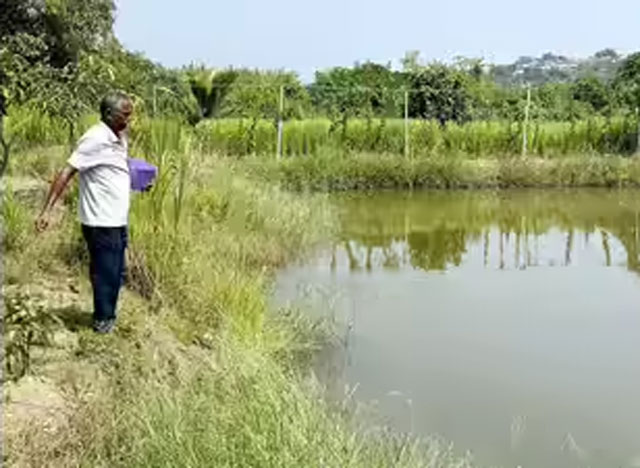Daijiworld Media Network - Panaji
Panaji, Oct 26: An innovative approach to fish farming is making waves in Merces, where progressive farmer Joaquim D’Souza has successfully transformed saline-affected land into a thriving freshwater aquaculture system. Collaborating with ICAR-CCARI, Old Goa, D’Souza has developed an adaptive model that adjusts salinity and pH levels, creating ideal conditions for freshwater fish.
D’Souza, a retired agriculture official, began experimenting with his farm even before retirement in 2017. Despite nearly three-fourths of the land being saline, he cultivated crops such as tomatoes, ladyfinger, sweet corn, and groundnut. Over time, he expanded to watermelons, bottle gourd, bitter gourd, sweet corn, mango, cabbage, cauliflower, chili, coconut, and three paddy varieties—Jaya, Goa Dhan 4, and a dwarf Basmati hybrid.

His efforts caught the attention of ICAR-CCARI, who recommended excavating a 2m-deep pond in 2018 to rear fish. Initial attempts with pearl spot (kalundar) and giant sea perch (chonak) were unsuccessful. Guided by the scientists, D’Souza shifted focus to freshwater carp varieties, rohu and catla, known for their robust bodies and nutritional benefits, including high protein and omega-3 content.
“The scientists continuously monitor the pond’s acidity and pH to ensure optimal growth conditions. The fish are expected to reach up to 1 kg in eight months, with harvest planned for February 2026,” D’Souza said.
Catering to Goa’s large migrant population, particularly North Indians who prefer freshwater fish, the venture is expected to fetch around Rs 400 per kg. “With changing demographics and increasing tourism, it’s time to grow foods that meet the dietary preferences of residents and visitors alike,” he added.
D’Souza’s initiative not only revives saline land but also showcases how adaptive aquaculture models can support sustainable farming while meeting market demand, potentially setting a precedent for similar projects across Goa.